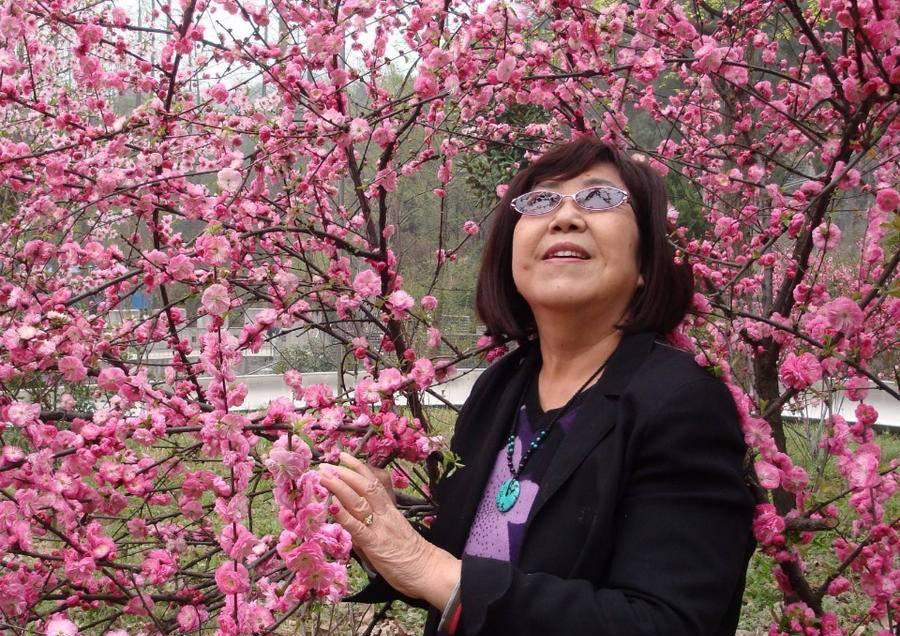[Qingwei Zhao Tongbin Poetry prose column 39] Unforgettable Mei Jie
Text/Zhao Tongbin

People who have experienced suffering have roughly three spiritual directions. One of them is decadent and sinking, and it is in a state of collapse. That's ordinary people. The second is sober and rational, deep and cold. Can be a philosopher. The third passion gushed out and was in full swing. That's the writer.
- Mei Jie belongs to the latter.
I have already set up a model of a writer in my mind, but many people who are called writers cannot come to me and sit down. I value the talent of a writer. Whether it is the way of acting, the way of talking, or the arrangement and combination of written symbols, it is unique. That kind of charm, that kind of emotion, that kind of feeling, cannot be completed by any acquired effort. Seeing Mei Jie, I immediately added a "new person" to my "writer mode". Her enthusiasm, her cheerfulness, her willingness to talk, her open and unguarded mind. And her hurried and cheerful figure has turned the 55-year-old into a simple and happy little girl. Under such a "primitive" first impression, you will never associate her with "suffering" in any way, and you cannot imagine that as a writer, she is from a university economics department. Of course, this is not surprising. Those who learn Chinese, who are well versed in the essentials of creative theory, may not be able to become writers; those who learn theory, although they do not remember routines, and therefore have no frame, may become a generation of famous artists. Zhang Jie and Zhang Xianliang are proof of this, and Mei Jie is also an example.
Mei Jie's suffering began in childhood. His father, who became a teacher after graduating from college, did not want to be beaten to the right in 1958. Overnight, cartoons about her father appeared on campus, and Mei Jie wrote in her essay masterpiece "Childhood Past Events": "Dad's appearance makes people draw ugly, his limbs are very developed, his head is very small, and some of them have a very long and thick furry tail..." The classmates also raised their voices and called out her father's name, all of which hurt a child so much that she always looked up in shame. Only her table mate, a little boy named Ah San, said to her, "I have never alkalinized your father's name", and at this moment, the tremor of her heart and the warmth of the acquisition made it remember it for a lifetime. She was 13 years old. After more than twenty years away from home, she resolutely returned to her hometown to look for Ah San, to find the warmth and gratitude of childhood. Mei Jie's suffering did not stop there, and two years later, in i960, the whole family was driven to the deep mountains and old forests of western Hubei. But 15-year-old Mei Jie did not follow, stubborn personality, not willing to be at the mercy of fate, alone to Xiangyang to find her brother as a teacher. After the "9981 difficulties", she completed junior high school, high school, college, and was assigned a job. Mei Jie was deeply pleased with her choice, and she said with emotion: "If I went to Western Hubei with my family, I would have married into a mountainous area and become an old woman who does not talk about family planning." There is no longer my current way of survival. Although she was assigned to Zhangjiakou outside Saiwai after graduating from university, the husband and wife were separated, and she took two children alone, while working, writing, and managing the housework, and suffered a lot. But in 1992, she was finally transferred to Shijiazhuang and became a professional writer in the Hebei Writers Association. All kinds of awards, all kinds of honors, all kinds of flowers and applause, diluted her suffering and became the greatest comfort for her spirit.
Mei Jie went to college for 5 years, majored in economics, and after graduation, she did more than ten years of economic work, but why did she suddenly engage in literary creation at the age of 36? Mei Jie said: "After my father's rightist problem was screened, the whole family finally walked out of the deep mountains and old forests, and that inhuman life was finally gone. But when I ran from Saiwai to Exi to visit my family, my father had died. My grief, my emotion, my silt, finally erupted like a volcano! I'm going to pick up a pen and talk..." At first, Mei Jie chose the style of poetry, and then chose prose and reportage. She has published 9 collections, but the last thing that really turns into her life form is prose. From her work, we see her unique pursuit of emotion and language.
Whether it is the way of survival or the way of expression of the work, Mei Jie is unforgettable.
2000.12.18
Zhao Tongbin is a member of the Chinese Writers Association, the Chinese Prose Literature Society, the Chinese Poetry Society, and the chairman of the Heze Writers Association. He has won more than 170 provincial awards and published more than 10 books.
Editor: Ma Xuemin
One point number Qingwei Heze creative base